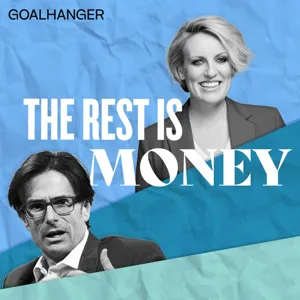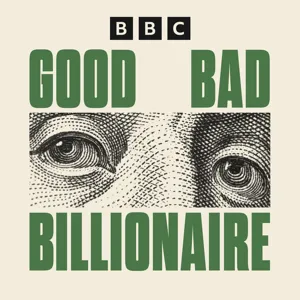Podcast Summary
Government's Bond Crisis Exacerbated by LDI Funds: The government's inability to afford tax cuts led to a bond crisis, worsened by LDI funds that had borrowed heavily to buy these bonds. The Bank of England was aware of the LDI market but failed to conduct a proper stress test, leading to unpreparedness when an interest rate shock occurred.
During a time of economic instability, the government's inability to afford proposed tax cuts led to a severe crisis in the government bond market. This crisis was exacerbated by investment funds, known as LDIs, which had borrowed money to buy these bonds. When the value of the bonds dropped, the banks demanded more collateral, causing a downward spiral in prices. The Bank of England was aware of the LDI market but had not conducted a proper stress test to determine the economic shocks that could bring these funds down. At the time, the Bank of England was led by Governor Andrew Bailey, Deputy Governor Sir Jon Cunliffe, and Sam Woods, who was in charge of bank financial stability. Despite their knowledge of the LDI market, they had not fully prepared for the potential consequences of an interest rate shock.
Bank of England's surprise during LDI crisis: Despite being responsible for maintaining financial stability, the Bank of England struggled to manage the LDI crisis due to the complexity and large number of pension funds involved.
During the mini budget crisis, the Bank of England was caught off guard by the issues in the LDI (Liability-Driven Investment) market, despite being responsible for maintaining price and financial stability. When the crisis came to light on the Monday following the mini budget, the Bank of England reached out to pension funds, asking them to bail out their LDI funds by transferring assets. However, this proved to be a challenge due to the large number of funds (3,000) and the fact that many of these funds had multiple pension fund owners. Convincing these multiple pension funds to transfer assets was likened to herding cats, making the process much more complicated. This illustrates the complexity of the financial system and the challenges that regulatory bodies face in managing and mitigating risks.
UK gilt market collapse exposes pension funds' vulnerability: The UK gilt market collapse highlighted the need for effective communication systems and risk management in pension funds and their LDI funds, especially when dealing with foreign institutions.
The Bank of England was caught off guard by the collapse of the UK gilt market in the aftermath of the mini-budget, which exposed the vulnerability of pension funds and their LDI (Liability-Driven Investment) funds, most of which are registered abroad. Many pension fund trustees, who are not financial experts and part-time, were unable to be reached due to the lack of a centralized communication system. The technical challenges of coordinating with foreign institutions further complicated the situation. The Bank of England attempted to encourage self-rescue efforts but ultimately had to intervene. The central bank's decision to sell £80 billion worth of government bonds, which put downward pressure on the gilt market, added to the turmoil. To prevent future crises, it is crucial for regulatory bodies to have effective communication systems in place and consider the potential risks and vulnerabilities of their financial markets.
Financial crisis jeopardizing government's ability to borrow: During a financial crisis, governments may struggle to borrow, leading to market instability and potential consequences if an indemnity isn't granted.
During a financial crisis, when a government's ability to borrow money in the bond market is jeopardized, it can lead to a mega crisis. This was the case for the Bank of England during a specific period following the death of the Queen, when investors were unwilling to lend to the government due to the sharp decline in government bonds. To prevent losses for the Bank of England and provide a solution, the Treasury granted an indemnity, allowing the Bank to purchase £65 billion worth of government bonds. This crisis highlights the importance of financial education and transparency, as well as the complexity of financial products that can make it difficult for the public to understand. The crisis also underscores the potential consequences when governments are unable to borrow, leading to significant market instability.
Bank of England's Emergency Bond Buying Program Amidst Political Tensions: The Bank of England bought £65 billion in bonds during a week of political tensions between the Bank and the Treasury, highlighting the divide between the economic establishment and the current government.
During the week of September 28, 2022, the Bank of England implemented an emergency £65 billion bond buying program to stabilize the market amidst growing tensions between the Bank and the Treasury. This event took place at the same time as a lavish dinner hosted by Bank of England Governor Andrew Bailey in honor of Tom Scholfield, who had recently been sacked by the Treasury. The dinner was attended by former chancellors, permanent secretaries, and other high-ranking officials, highlighting the divide between the economic establishment and the current government. Reports also surfaced that the Treasury had considered getting rid of Bailey, but due to the rules protecting the governor's independence, this was nearly impossible. Bailey, feeling the pressure from the government's criticisms of the Bank's handling of inflation, hosted the dinner for the sacked official. Bailey, who is known for his down-to-earth demeanor and genial personality, was a contrast to the more charismatic and performative Mark Carney, who had previously served as governor. Despite the tensions, Bailey continued to lead the Bank, emphasizing the importance of maintaining its independence.
Pivotal Deadline during the Financial Crisis: During the financial crisis, a significant deadline for ending the Bank of England's bond buying program created uncertainty and chaos, but was crucial for addressing financial instability.
During the financial crisis, the individual in question had a mixed record while leading financial conduct authorities. He faced criticism for not effectively regulating certain institutions, but was also admired for his steady handling during the crisis. More recently, his failure to address inflationary pressures earlier was a major criticism. At a dinner during this time, a significant deadline was discussed - the ending of the Bank of England's bond buying program on October 14th. This deadline was imposed to pressure pension funds and LDIs to resolve their issues, and it was also crucial for the government as it helped stabilize the gilt market. However, the fear was that once the program ended, gilts could go into meltdown due to international investors' disapproval of the mini-budget and its unfunded tax cuts. This uncertainty negatively impacted Tory MPs, leading to chaos at the Tory party conference. Ultimately, the individual's record remains mixed, but the deadline for ending the bond buying program was a pivotal moment in addressing the financial instability.
UK's Mini-Budget Sparks Outrage and Criticism: The UK's mini-budget faced backlash due to the proposed abolition of the 45% tax rate for the wealthy during a cost of living squeeze, leading to international criticism and financial instability.
The UK's mini-budget in 2022, presented by Kwasi Kwarteng and Jeremy Hunt, faced significant backlash due to the proposed abolition of the 45% tax rate for the wealthy. This decision, which came during a cost of living squeeze, sparked outrage and anxiety among the public and even international institutions like the IMF. The chancellor's attempt to reassure critics in Washington resulted in a humiliating experience for the UK government, as the IMF openly criticized the budget for increasing inequality. Additionally, the Bank of England's wobbling bond market, specifically regarding index-linked gilts, added to the financial instability. Overall, the mini-budget presented a significant challenge for the UK government, both domestically and internationally.
Bank of England increases bond purchases, considers extending rescue: The Bank of England is escalating its crisis response by increasing daily bond purchases and considering extending the rescue beyond the deadline, but faces uncertainty about the safety of LDI funds and potential political implications.
The Bank of England has announced it will increase its daily bond purchases from 5 billion to 10 billion pounds and for the first time, will buy inflation-protected government bonds. This is a significant escalation in the crisis response, as the Bank is not fully confident the rescue will succeed. The governor of the Bank of England is considering whether to extend the rescue beyond the current deadline, but faces uncertainty about the safety of LDI funds by then. The decision has both financial and political implications, as it could effectively bail out the government's tax cuts and potentially lead to monetary disaster. The Bank of England must balance the need to provide financial stability with the risk of crossing into political territory. The governor is in discussions with the Treasury, but ultimately, this is a decision for an independent Bank of England.
UK's Economic Instability and Political Crisis for Prime Minister Liz Truss: Prime Minister Liz Truss faced a political crisis due to economic instability, leading to the sacking of her chancellor and potential end of her premiership.
The UK's economic instability during this time, marked by a collapse in bond prices and a subsequent rise in interest rates, led to a political crisis for Prime Minister Liz Truss. The situation resulted in an electoral catastrophe for her government, with the reputation for financial stability being heavily damaged. Truss was faced with a difficult decision: either bail out her chancellor indefinitely, risking economic disaster, or set a deadline, leading to his inevitable sacking. The situation reached a climax when Truss sacked her chancellor, Kwasi Kwarteng, and appointed Jeremy Hunt in his place. The moment was dramatic, with the end of Kwarteng's tenure potentially signaling the end of Truss's premiership. In the following episodes, we will discuss what transpired over the subsequent weekend and explore the implications of this political crisis for anyone in government.






